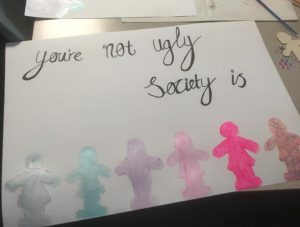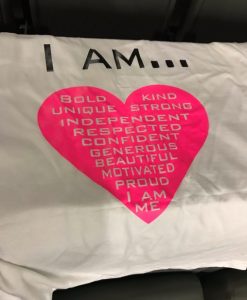Dr Sarah Winkler-Reid’s Girl-Kind project at Newcastle University was featured by the Economic and Social Research Council (ESRC) last week, as a brilliant example of how an impact project can develop over time. This is a reblog of the original article found here. For more on the Girl-Kind project and for updates see their website here.
Young people in the North today are proud of where they from and proud to be Northern, shows research from the Children’s Commissioner for England. At the same time, many are growing up in communities of entrenched disadvantage. In relation to girls, the 2016 report The State of Girls’ Rights in the UK by Plan International UK found that ‘a girl’s location is critical’ across many different aspects of her life, including opportunities and access to resources.
The Girl-Kind North East project was launched in response to these findings, which identified North East England as the ‘worst place to be a girl’ – based on indicators such as child poverty, female life expectancy, teenage pregnancy, GCSE grades and whether girls were in education, employment or training. The project creates a space for girls themselves to explore these contradictions, without imposing assumptions about what these statistics tell us about their own experiences.
The project is led by Dr Sarah Winkler-Reid, a Lecturer in Social Anthropology at Newcastle University, and Dr Sarah Ralph, a Senior Lecturer in Media and Cultural Studies at Northumbria University. Both conduct research on girls’ lives and growing up in Britain, and have drawn on this work to develop Girl-Kind. Sarah Winkler-Reid’s ethnographic research in a London school explores young people’s everyday lives and relationships in school, while Sarah Ralph explores how media is used in everyday social interactions. Despite stereotypical media representations of girls as passive and unthinking, both these studies encountered girls as active, skilled and critical individuals.
A pessimistic and moralist tone pervades media representations of contemporary girls. However, the girls we have encountered through our previous research and through Girl-Kind are thoughtful, critical and reflective about both their own lives and how news and fictional media represents them (Sarah Winkler-Reid)
Working with groups of girls aged 11-16 from schools across the North East, the Girl-Kind project creates a space for girls to explore their own selves, relationships and contemporary representations of girlhood, with workshops leading up to UN’s International Day of the Girl Child in October. An initial workshop focuses on the challenges and opportunities of growing up as a girl in the North East. The participants choose a particular focus theme and produce creative outputs and performances that are showcased on the International Day to family members, friends, invited dignitaries, and members of the public.
With funding from an ESRC-funded Impact Acceleration Account (IAA), the pilot project in 2017 was carried out with Year 10 students at two schools in Newcastle and South Shields. The project expanded through follow-on ESRC IAA funding in 2018 with five further schools, in North Tyneside, County Durham and Teesside. It will run for the third time in 2019 in ten schools across the North East.
“We are constantly in awe of way girls are able to articulate their experiences and their righteous sense of injustice. They have devised so many fantastic, creative and distinctive ways to express these,” adds Dr Winkler-Reid. “The International Day of the Girl offers a dedicated day for them to revel in the brilliance of being a girl from the North East. Our event is a celebration for the girls, as well as opportunity for the audience to learn about what it means to be growing up as a girl today.”


